- Afrikaans
- Albanian
- Amharic
- Arabic
- Armenian
- Azerbaijani
- Basque
- Belarusian
- Bengali
- Bosnian
- Bulgarian
- Catalan
- Cebuano
- Corsican
- Croatian
- Czech
- Danish
- Dutch
- Saesneg
- Esperanto
- Estonian
- Finnish
- French
- Frisian
- Galician
- Georgian
- German
- Greek
- Gujarati
- Haitian Creole
- hausa
- hawaiian
- Hebrew
- Hindi
- Miao
- Hungarian
- Icelandic
- igbo
- Indonesian
- irish
- Italian
- Japanese
- Javanese
- Kannada
- kazakh
- Khmer
- Rwandese
- Korean
- Kurdish
- Kyrgyz
- Lao
- Latin
- Latvian
- Lithuanian
- Luxembourgish
- Macedonian
- Malgashi
- Malay
- Malayalam
- Maltese
- Maori
- Marathi
- Mongolian
- Myanmar
- Nepali
- Norwegian
- Norwegian
- Occitan
- Pashto
- Persian
- Polish
- Portuguese
- Punjabi
- Romanian
- Russian
- Samoan
- Scottish Gaelic
- Serbian
- Sesotho
- Shona
- Sindhi
- Sinhala
- Slovak
- Slovenian
- Somali
- Spanish
- Sundanese
- Swahili
- Swedish
- Tagalog
- Tajik
- Tamil
- Tatar
- Telugu
- Thai
- Turkish
- Turkmen
- Ukrainian
- Urdu
- Uighur
- Uzbek
- Vietnamese
- Welsh
- Bantu
- Yiddish
- Yoruba
- Zulu
Children's Electric Car Ride Ons: 2-Seater, Bumper & Audi Models
Introduction to Advanced Children's Electric Vehicle Solutions
In the rapidly evolving market of recreational products for children, the demand for high-quality, safe, and technologically advanced children's electric car ride ons continues to surge. These sophisticated miniature vehicles are no longer mere toys but represent a significant segment within the juvenile products industry, driven by innovation in battery technology, motor performance, and integrated safety features. For B2B stakeholders, including retailers, distributors, amusement park operators, and promotional agencies, understanding the technical intricacies and market dynamics of these products is crucial for strategic procurement and market positioning. This comprehensive article delves into the core aspects of advanced electric ride-on vehicles, offering insights into their manufacturing, technical specifications, application potential, and competitive advantages in the global market.
Current Industry Trends and Market Dynamics
The global market for children's electric car ride ons is experiencing robust growth, fueled by several key trends. Parental emphasis on early childhood development, coupled with a desire for engaging and safe outdoor play, drives consumer demand. Technologically, advancements in lithium-ion battery efficiency, brush-less DC motor longevity, and integrated smart features such as remote parental control and multimedia entertainment systems (e.g., MP3 connectivity) are reshaping product offerings. The advent of specialized models, like the children's electric car 2 seater, caters to families with multiple children or those seeking a more interactive play experience. Furthermore, the market is witnessing an increased demand for licensed vehicles, such as an audi children's electric car, reflecting a premiumization trend where brand authenticity and detailed replication of adult vehicles are highly valued.
Beyond traditional ride-ons, innovative categories like the electric children's bumper car are gaining traction in commercial settings like indoor play zones and family entertainment centers. Market research from leading analytical firms indicates a compound annual growth rate (CAGR) of approximately 7-9% for electric ride-on toys over the next five years, with North America and Europe leading in terms of market share, followed closely by the Asia-Pacific region. This growth is underpinned by increasing disposable incomes and urbanization, which necessitate compact yet engaging play solutions. The shift towards sustainable and child-safe materials also plays a significant role in market segmentation and product development.
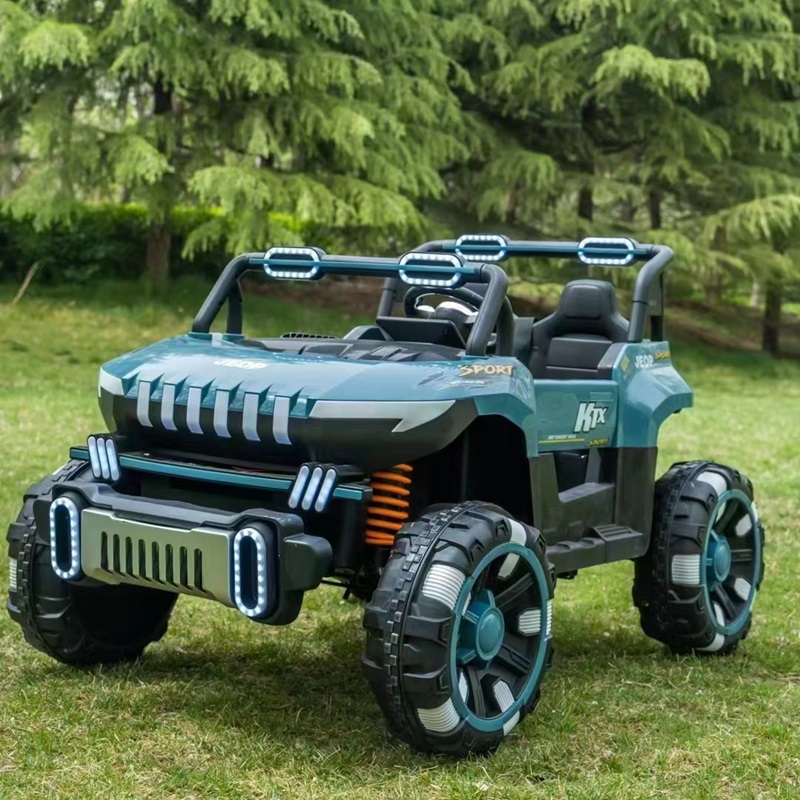
Technical Specifications and Performance Parameters
The performance and safety of children's electric car ride ons are directly tied to their underlying technical specifications. Key parameters include battery voltage and capacity, motor power, drive system (e.g., 2WD, 4WD), speed capabilities, and chassis material. Understanding these specifications is paramount for B2B buyers evaluating product suitability for specific markets or applications. For instance, a 12V All-Wheel Drive (AWD) system offers superior traction and handling compared to a standard 6V 2WD system, making it suitable for varied terrains or heavier loads, as often required for a children's electric car 2 seater. Advanced models now incorporate features like electronic power steering, independent suspension, and even robust braking systems for enhanced control and safety.
Consider the product: "Children battery baby 12v ride on car toys electric ride on remote for kid 12v All Wheel Drive Operated Baby Ride on Electrical Toy Car Mp3". This model exemplifies a robust configuration designed for enhanced performance and user experience, meeting stringent safety and durability benchmarks.
Product Specification Table: Premium 12V AWD Electric Ride-On
| Parameter | Specification |
|---|---|
| Model Name | Children Battery Baby 12V Ride On Car |
| Battery Voltage & Capacity | 12V (e.g., 12V7AH or 12V10AH Lead-Acid/Lithium options) |
| Drive System | All Wheel Drive (AWD) - typically 4 motors (4x45W or 4x35W) |
| Motor Type | DC Electric Motors (typically brushed, high-end may be brushless) |
| Max Speed | Up to 5-7 km/h (3-4.5 mph) with parental speed control options |
| Max Load Capacity | 30-50 kg (66-110 lbs) depending on chassis strength and motor power |
| Charging Time | 8-12 hours for a full charge (for SLA batteries) |
| Play Time per Charge | 1-2 hours (dependent on terrain, speed, and load conditions) |
| Control System | Manual (pedal/steering) & 2.4G Bluetooth Remote Parental Control |
| Safety Features | Seat belt, soft start/stop, LED lights, parental remote emergency brake, auto-braking |
| Multimedia | MP3 connectivity (USB/AUX), pre-loaded music, horn sounds, story mode |
| Material | Durable PP (Polypropylene) Plastic body, Metal Chassis, Rubber/Plastic Tires |
| Certifications | CE, EN71, ASTM F963, RoHS (typical manufacturer adherence) |
The implementation of features like All-Wheel Drive (AWD) is a significant technical advantage, providing enhanced torque distribution across all wheels, which is crucial for navigating uneven surfaces or inclines encountered in play environments. This directly translates to a more reliable and enjoyable experience for the end-user, and superior durability for commercial applications. Furthermore, the 2.4G Bluetooth remote control offers a robust, interference-free connection, critical for parental safety intervention, distinguishing it from older IR remote technologies.
Precision Manufacturing Process of Children's Electric Ride-Ons
The production of high-quality children's electric car ride ons involves a multi-stage, precision-engineered manufacturing process designed to ensure product integrity, safety, and longevity. This process integrates advanced industrial techniques with stringent quality control protocols to meet international standards such as ISO 9001 for quality management and specific toy safety standards like EN71 (Europe) and ASTM F963 (USA). The emphasis is on repeatable quality and compliance.
Key Manufacturing Stages:
- Design & Prototyping:
Utilizing CAD (Computer-Aided Design) software, initial concepts are translated into detailed 3D models. FEA (Finite Element Analysis) is often applied to critical stress points to ensure structural integrity. Rapid prototyping technologies, such as 3D printing and CNC machining of molds, are employed to create physical samples for ergonomic and functional validation before full-scale tooling begins. This ensures optimal vehicle geometry, component fit, and aesthetic appeal, particularly for licensed models like an audi children's electric car.
- Material Sourcing & Preparation:
High-grade, non-toxic raw materials are meticulously sourced from certified suppliers. This primarily includes virgin PP (Polypropylene) plastic with UV stabilizers for body shells, ABS (Acrylonitrile Butadiene Styrene) for intricate components, and high-strength, rust-resistant steel for chassis frames and axles. All incoming materials undergo strict chemical analysis and physical testing to ensure compliance with phthalate-free, lead-safe, and REACH regulations.
- Injection Molding:
The majority of plastic body parts are manufactured using advanced, automated injection molding techniques. Molten plastic pellets are injected under high pressure into precision-engineered molds, forming consistent, strong, and aesthetically precise components. This process ensures uniformity, minimal warping, and superior structural integrity, critical for the long-term durability and safety of ceir trydan plant. Robotic arms are often employed for precise demolding.
- Component Fabrication (Motors, Batteries, Electronics):
Electric motors, custom wiring harnesses, robust PCBs (Printed Circuit Boards), and battery packs (often 12V lead-acid or increasingly, lithium-ion) are either manufactured in-house or sourced from certified specialized suppliers with ISO/TS 16949 compliance. Each component undergoes individual functional testing, including load testing for motors and cycle testing for batteries, to verify operational parameters and adherence to electrical safety standards like UL or CE.
- Surface Treatment & Finishing:
Plastic body panels receive specialized surface treatments. This can include multi-layer, high-gloss UV-resistant painting for enhanced durability and aesthetic appeal, or in-mold decoration (IMD) for integrated graphics. Decals, badging, and branding are applied precisely using automated systems, ensuring longevity and resistance to peeling or fading.
- Assembly:
A semi-automated or manual assembly line combines the steel chassis, molded body, rubberized wheels, advanced electrical components, comfortable seats, and multimedia systems. Each station employs highly trained technicians and utilizes specialized, calibrated tools to ensure precise fitting and secure fastening. Torque calibration is routinely used for critical fasteners, and Poka-Yoke (mistake-proofing) principles are integrated to prevent assembly errors.
- Quality Control & Performance Testing:
Every finished unit undergoes comprehensive quality assurance and rigorous performance testing. This includes:
- Functional Tests: Verification of motor operation, steering mechanism, LED lights, horn, remote control functionality, MP3 player, and speed control.
- Safety Tests: Static load bearing, dynamic stability tests (to prevent tipping on turns), material stress tests, impact resistance, and emergency stop feature validation. Products like electric children's bumper cars undergo specific collision impact tests.
- Battery System Tests: Ensuring specified charge/discharge cycles, run-time under load, and thermal stability.
- Durability Testing: Accelerated wear and tear simulations to assess service life, particularly for components subject to continuous use. This helps validate a robust design for commercial fleets.
- Packaging & Logistics:
Products are securely packaged in robust, corrugated cartons, often with custom-molded foam inserts and edge protectors, to prevent damage during international transit. Detailed multi-lingual assembly instructions and user manuals are included. Packaging is optimized for container111 loading efficiency.
The typical service life for a well-maintained children's electric car is 3-5 years for consumer use, and 1-2 years for heavy commercial applications (e.g., rental fleets), depending on usage intensity and adherence to maintenance protocols. Adherence to international testing standards like ISO 8124 (Toy Safety) and IEC 62115 (Electric Toys) is critical for market acceptance and consumer confidence.
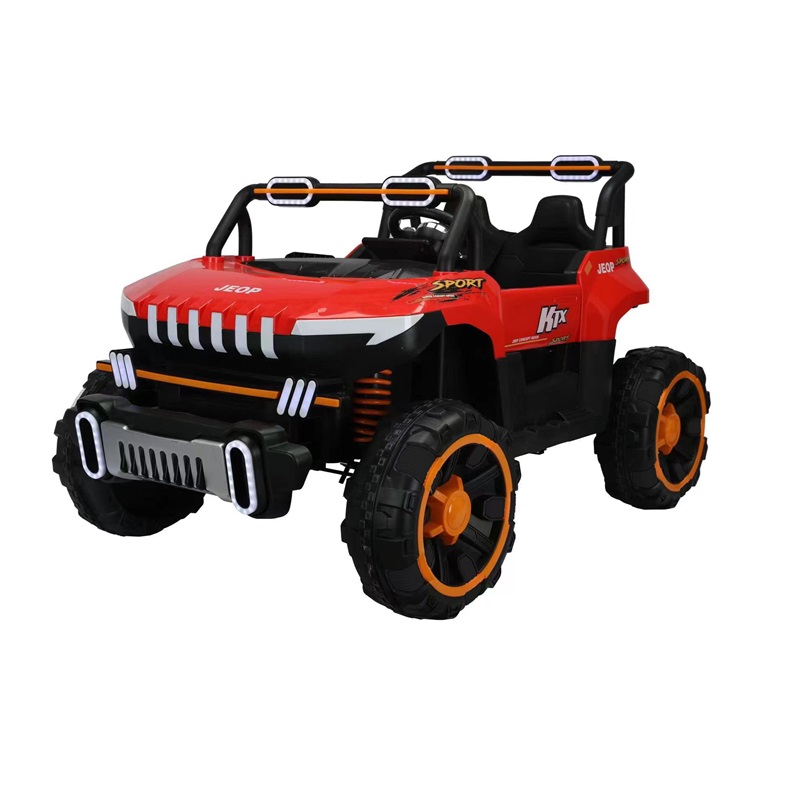
Application Scenarios and Operational Advantages
The versatility of children's electric car ride ons extends beyond individual household use, finding significant application in various B2B contexts. These durable and engaging vehicles offer distinct operational advantages for businesses targeting families and children, enhancing customer experience and revenue generation.
Key Application Scenarios:
- Retail & Distribution Networks: Serving as a high-demand product category for major toy retailers, department stores, and online e-commerce platforms globally. The wide range of models, including licensed ceir trydan plant (like an audi children's electric car), offers extensive market appeal across various demographics and price points.
- Family Entertainment Centers (FECs) & Amusement Parks: Specially designed robust models, such as electric children's bumper cars or multi-seater ride-ons, provide revenue-generating attractions. Their robust construction, easy maintenance, and integrated safety features make them ideal for high-traffic, continuous operational environments.
- Resorts, Hotels & Holiday Villages: Offering premium guest amenities and dedicated children's activity programs, thereby enhancing customer satisfaction and loyalty. The quiet electric operation is particularly advantageous in hospitality settings, minimizing noise pollution.
- Educational Institutions & Daycares: Providing stimulating and safe play equipment that encourages outdoor activity, spatial awareness, and social interaction among children in a controlled environment. The educational aspect of learning basic driving skills is also a benefit.
- Corporate Gifting & Promotional Events: Custom-branded ride-ons can serve as unique and memorable promotional tools or high-value corporate gifts, offering significant brand visibility and consumer engagement for marketing campaigns.
Demonstrated Operational Advantages in Typical Scenarios:
- Energy Efficiency & Optimized Battery Management: Modern 12V electric systems with highly optimized motor controllers and intelligent charging circuits offer extended run times (1-2 hours) on a single charge. This minimizes operational costs for commercial operators and reduces the frequency of recharging cycles, leading to significant energy savings comparable to efficient industrial equipment. Battery health monitoring systems further extend battery life.
- Enhanced Durability & Environmental Resistance: The use of high-grade PP plastic, often UV-stabilized and reinforced, ensures excellent resistance to environmental factors such as direct sunlight, moisture, and minor impacts, preventing color fading, material degradation, and cracking. Metal chassis components are typically treated with multi-layer anti-corrosion coatings (e.g., powder coating, galvanization), extending the product's lifespan even in outdoor or humid environments, mirroring the robust requirements for industrial equipment in harsh conditions.
- Superior Safety Features & Control: Integrated soft-start technology prevents sudden jolts and lurching, significantly reducing the risk of injury, especially for younger children. The 2.4G Bluetooth remote control provides critical parental override capabilities, allowing immediate cessation of movement, precise speed adjustment (e.g., 3-speed modes), and steering correction from a distance. Multi-point seat belts, robust construction, wider wheelbases for stability, and anti-slip rubberized tires further enhance user safety, aligning with rigorous international safety standards.
- Low Maintenance Requirements & Ease of Service: Electric drive systems inherently require less maintenance compared to their gasoline-powered counterparts, with no oil changes, spark plug replacements, or complex fuel systems. Routine checks primarily involve battery health monitoring, tire pressure, and occasional lubrication of moving parts, significantly reducing downtime and operational overhead for B2B users. Modular design facilitates easier replacement of worn components.
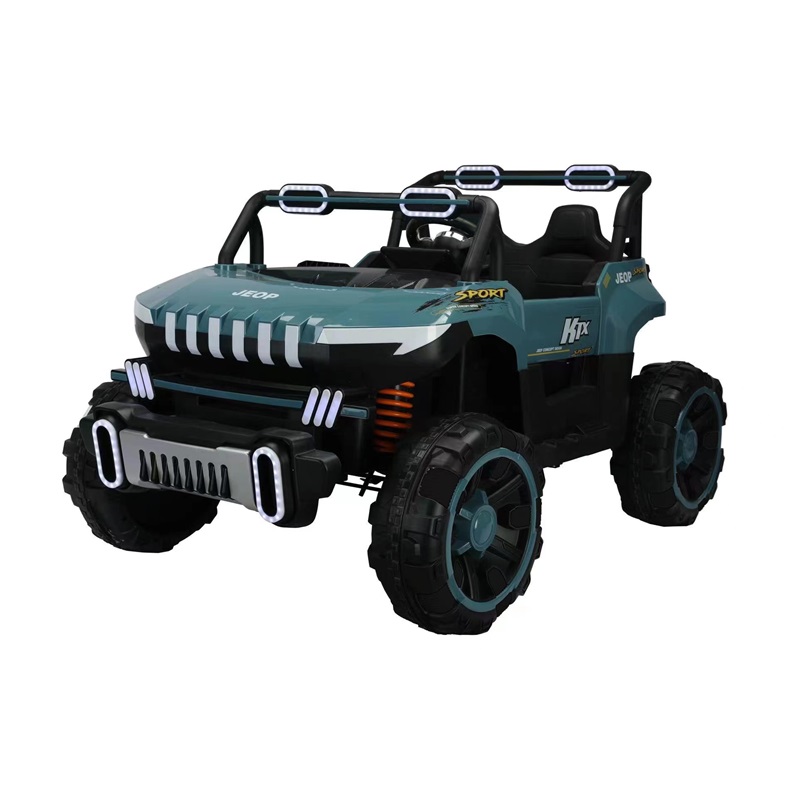
Vendor Comparison: Evaluating Suppliers for Children's Electric Ride-Ons
Selecting the right vendor for children's electric car ride ons is a critical decision for B2B buyers, impacting product quality, supply chain reliability, and overall profitability. A comprehensive evaluation involves assessing technical expertise, manufacturing capabilities, adherence to international standards, customization flexibility, and after-sales support. Due diligence in vendor selection ensures a stable, high-quality product supply.
Comparative Analysis of Leading Suppliers:
| Feature/Criterion | DH Electric Kid Car (Our Offering) | Competitor A (Premium Brand) | Competitor B (Value Brand) |
|---|---|---|---|
| Product Range & Innovation | Extensive, incl. 12V AWD, 2-seater, licensed models, soft-start, 2.4G remote. Focus on core performance and safety. | Limited to high-end licensed models. Innovation often cosmetic. | Basic 6V/12V models, fewer advanced features. Price-point driven. |
| Quality Certifications | CE, EN71, ASTM F963, ISO 9001 (Mfg. Process), RoHS. Verified compliance. | Similar, but often with higher premium pricing due to brand licensing. | Basic safety certs, sometimes incomplete or less rigorously enforced. |
| Customization Options | Extensive (branding, color, specific features, packaging, regional compliance adaptations). | Limited to very large, strategic orders due to brand guidelines. | Minimal to none; primarily off-the-shelf products. |
| Lead Time & Fulfillment Reliability | Competitive and consistent (20-45 days typically). High order fulfillment rate (97%). | Longer for bespoke orders or new designs. May prioritize larger clients. | Often inconsistent, highly dependent on stock and external factors. |
| Warranty & After-Sales Support | Robust (1-year parts warranty, 6-month battery, dedicated multilingual support, spare parts availability). | Good, but often tiered service levels. Spare parts can be expensive. | Limited or difficult to access. Reliance on distributor for support. |
| Pricing Strategy | Value-driven, balancing advanced features, high quality, and competitive cost. | Premium pricing, primarily driven by brand equity and perceived luxury. | Aggressive low-cost, potentially compromising material quality and long-term reliability. |
Our offering, exemplified by products like the 12V All-Wheel Drive Operated Baby Ride on Electrical Toy Car, stands out by providing a superior balance of advanced technical features, comprehensive safety compliance, and flexible customization options, positioning us as a preferred partner for discerning B2B clients who seek reliability and market advantage.
Customized Solutions for Diverse Market Needs
Recognizing the varied requirements of the global B2B market, we offer extensive customization capabilities for our range of electric ride-on vehicles. This allows clients to tailor products to specific regional preferences, stringent branding guidelines, or unique functional requirements, ensuring maximum market penetration and brand alignment.
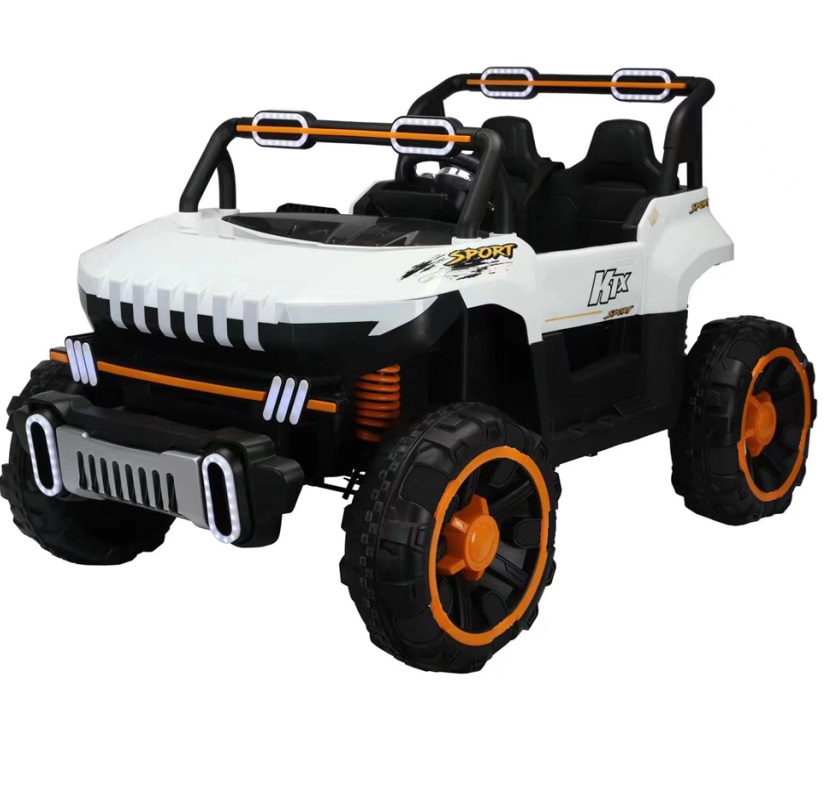
- Branding & Livery: Custom color schemes, application of client logos and decals, and integration of specific brand elements for licensed products or promotional campaigns. This is particularly valuable for creating unique ceir trydan plant that resonate with specific market segments. We can match pantone colors precisely.
- Feature Set Modifications: Addition or removal of specific components such as advanced multimedia systems (e.g., larger LCD screens, Bluetooth music streaming), upgraded battery packs for extended run-time, specialized tire types (e.g., EVA foam, pneumatic rubber) for different terrains, or enhanced seating configurations for children's electric car 2 seater models.
- Packaging Solutions: Tailored packaging designs, including multi-lingual instructions, specific carton dimensions for optimized shipping (e.g., FCL, LCL), and retail-ready display packaging with custom graphics and product information. We also offer eco-friendly packaging alternatives.
- Regulatory Compliance Adaptation: Adapting products to meet specific regional safety and electrical standards (e.g., GCC standards for the Middle East, KC for Korea, CCC for China) beyond our core CE/EN71/ASTM F963 certifications, ensuring seamless and rapid market entry for our partners. This includes relevant documentation and testing.
- Performance Tuning: Fine-tuned adjustments to motor power output and maximum speed settings to conform to local regulations or specific application requirements, for instance, a lower maximum speed for public rental operations or higher torque for rough terrain. This ensures optimal operation in diverse environments.
Our engineering team collaborates closely with clients from concept to production, leveraging extensive experience to transform unique requirements into viable product configurations. This ensures that the final output aligns perfectly with their strategic objectives, target demographic, and regulatory landscape, providing a distinct competitive edge.
Real-World Application Case Studies
The practical utility and robust performance of our electric ride-on vehicles are best demonstrated through successful real-world applications. These case studies highlight the adaptability and reliability of our products in diverse commercial environments, showcasing our commitment to delivering value to B2B partners.
Case Study 1: Theme Park Integration (Middle East)
A major theme park operator in the UAE sought a fleet of highly durable and engaging miniature vehicles for a new children's driving school attraction. The requirement was for high-capacity, low-maintenance ceir trydan plant capable of operating continuously for 8-10 hours daily in high ambient temperatures, with stringent safety protocols. We supplied a customized fleet of our 12V All-Wheel Drive models, featuring reinforced chassis, enhanced passive battery cooling systems, and specialized heavy-duty EVA rubber tires for superior grip and wear resistance. The 2.4G remote parental control system was also integrated with the park's central ride management software, allowing staff to manage vehicle speeds, routes, and emergency stops dynamically from a central console.
- Outcome: The fleet has demonstrated exceptional reliability, achieving an average uptime of 98% over two years of intensive operation. Maintenance costs were 30% lower than anticipated due to the robust design and efficient electric drivetrain, which requires minimal servicing. Customer feedback on the driving school experience has been overwhelmingly positive, leading to increased visitor engagement and repeat visits, directly contributing to the park's revenue goals.
Case Study 2: Retail Chain Product Launch (Europe)
A prominent European toy retail chain aimed to launch a premium line of electric ride-on toys under its private label, with a strong focus on licensed replica vehicles. The challenge was to source a supplier capable of producing authentic audi children's electric car models and other popular brands that met stringent EU safety standards (EN71, RoHS, CE) while maintaining a competitive price point to capture significant market share. We collaborated closely with their product development team to design and manufacture a range of 12V 2-seater and single-seater models. These vehicles meticulously replicated licensed designs, integrating advanced features like working LED lights, functional dashboards, and comprehensive multimedia systems, all while passing rigorous third-party safety audits.
- Outcome: The product line successfully launched across 500+ stores in multiple European countries, exceeding initial sales forecasts by 25% within the first quarter. The high-quality finish, authentic design details, and reliable performance garnered excellent customer reviews and minimal returns, establishing the retailer's private label as a leader in premium ride-on toys and significantly enhancing their market position in the competitive European toy sector.
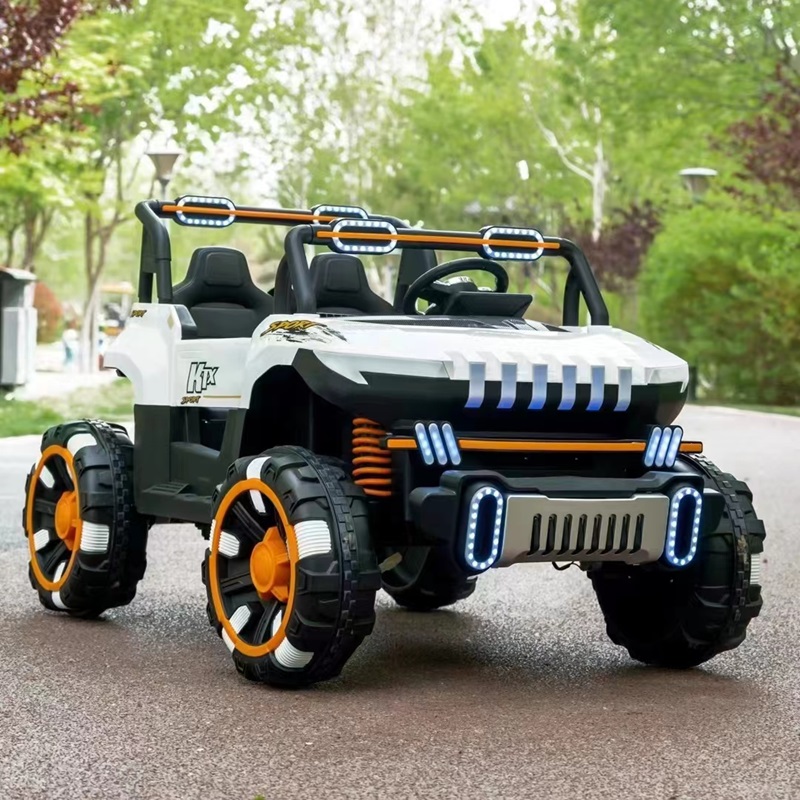
Commitment to Trust and Reliability: FAQs, Lead Time, Warranty, and Support
Frequently Asked Questions (FAQs)
Q1: What are the primary safety certifications for your children's electric car ride ons?
A1: All our products adhere to international safety standards including CE (Conformité Européenne), EN71 (European Toy Safety Directive Parts 1, 2, 3), ASTM F963 (US Toy Safety Standard), and RoHS (Restriction of Hazardous Substances) for material compliance. Specific regional certifications can be provided upon request for target markets to ensure full legal compliance.
Q2: Can the speed of the electric ride-ons be regulated for different age groups and safety needs?
A2: Yes, our 12V models typically feature multiple speed settings (low, medium, high) selectable via the in-car controls or, more critically, through the 2.4G Bluetooth parental remote control. This allows adults to dynamically adjust the speed and intervention level for enhanced safety, especially for younger or less experienced children.
Q3: What types of batteries are typically used, and what is their expected lifespan and care?
A3: We primarily utilize sealed lead-acid (SLA) batteries (e.g., 12V7AH or 12V10AH) due to their proven reliability, cost-effectiveness, and robust performance in children's ride-ons. Upon client request, higher-performance lithium-ion alternatives are available for enhanced longevity and lighter weight. The expected lifespan for SLA batteries is 1-2 years under normal usage and proper charging habits. We recommend full discharge before recharging and storage at optimal temperatures. Replacement batteries are readily available through our spare parts program.
Q4: Are spare parts readily available for repair and long-term maintenance?
A4: Absolutely. We understand the importance of long-term serviceability for our B2B clients. We maintain a comprehensive inventory of all critical spare parts, including motors, gearboxes, batteries, chargers, remote controls, control boards, steering components, and body panels. Parts catalogs, detailed exploded diagrams, and technical repair guides are provided to facilitate easy ordering and maintenance. This ensures minimal downtime and extended product life for your inventory or rental fleet.
Lead Time and Fulfillment Details
Our standard lead time for bulk orders of ceir trydan plant ranges from 20 to 45 business days, depending on order volume, the complexity of customization requirements, and current production schedules. We operate efficient, ISO 9001 certified logistics and supply chain networks to ensure timely and reliable delivery worldwide. Expedited manufacturing and shipping options may be available for urgent requirements, subject to an agreed-upon schedule. Detailed production and shipping schedules are provided to clients promptly upon order confirmation, and we maintain an average order fulfillment rate of 97% for the past three years, underscoring our commitment to punctuality and reliability.
Warranty Commitments
We stand by the quality and durability of our products. We offer a standard 1-year warranty on major functional components, including motors, gearboxes, and control boards. Batteries and chargers are covered by a 6-month warranty, effective from the date of shipment. This comprehensive warranty covers manufacturing defects under normal operating conditions and prescribed usage. Detailed warranty terms, conditions, and claim procedures are readily available for review, providing transparency and assurance to our B2B partners.
Dedicated Customer Support
Our dedicated B2B customer support team comprises experienced technical specialists available to assist with any queries, from initial product selection and customization to technical troubleshooting and spare parts ordering. Support can be accessed efficiently via email, phone, or a dedicated online client portal. We provide comprehensive technical manuals, detailed assembly instructions, and video tutorials to facilitate easy setup, maintenance, and basic repairs for our partners, ensuring a seamless and supportive post-purchase experience. Our commitment is to ensure the maximum operational efficiency and satisfaction for all our clients and their end-users.
Conclusion: Partnering for Excellence in Children's Electric Mobility
The market for children's electric car ride ons is dynamic, innovative, and ripe with opportunities for businesses that prioritize quality, safety, and technological advancement. As a leading manufacturer and supplier, we are committed to delivering cutting-edge solutions, exemplified by products like our 12V All-Wheel Drive electric ride-on. Our adherence to stringent manufacturing processes, comprehensive quality control, and dedication to customer support positions us as an ideal partner for B2B clients looking to thrive in this rapidly expanding sector. By focusing on technical superiority, flexible customization, and unwavering reliability, we empower our partners to offer exceptional products that delight children and assure parents, building a foundation for sustained commercial success and market leadership.
References
- European Committee for Standardization. (2011). EN 71-1: Safety of toys - Part 1: Mechanical and physical properties. Brussels, Belgium.
- ASTM International. (2017). ASTM F963-17: Standard Consumer Safety Specification for Toy Safety. West Conshohocken, PA.
- International Organization for Standardization. (2015). ISO 9001: Quality management systems - Requirements. Geneva, Switzerland.
- Grand View Research. (2023). Ride-On Toys Market Size, Share & Trends Analysis Report.
- Statista. (2023). Revenue of the toys & games market worldwide.
- International Electrotechnical Commission. (2019). IEC 62115: Electric toys - Safety. Geneva, Switzerland.
-
Sports Kids Bike: High Carbon Steel Argon Arc Welded Frame | Beautiful GiftNewyddionAug.30,2025
-
Ultimate 24V Children's Car: Power, Fun & Safety for KidsNewyddionAug.29,2025
-
Children's Electric Car Ride Ons: 2-Seater, Bumper & Audi ModelsNewyddionAug.28,2025
-
Understanding Voltage in Battery for Children's Motorized CarNewyddionJun.05,2025
-
Safety Features to Look for in an Electric Car for KidsNewyddionJun.05,2025
-
How to Teach Your Child to Ride a Kids MotorcycleNewyddionJun.05,2025
